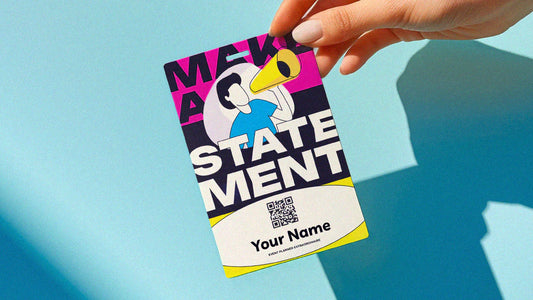Planning an event can feel like juggling a million moving parts. Whether you’re organizing a corporate conference, a promotional event, or a trade show, there’s no denying that it’s a lot to manage. This checklist is designed to help you stay organized and on track, but remember—it’s just a guideline. Every event is unique, and your plan may evolve as you go. Take a deep breath, and let’s dive in!
12+ Months Before the Event
The early planning stage is all about laying a strong foundation. At this point, you’re setting the tone for the entire event. Focus on defining your goals, assembling your team, and securing the essentials like the date and venue. Don't forget the 5 P's of Event Planning! Think of this as planting the seeds for success—the more you prepare now, the smoother things will go later.
1. Define Event Goals and Objectives:
◻ Determine the purpose (e.g., education, networking, product launch).
◻ Identify target audience.
2. Budget Creation:
◻ Estimate overall budget.
◻ Allocate funds for venue, catering, marketing, speakers, and contingencies.
3. Assemble the Planning Team:
◻ Assign roles (e.g., logistics, marketing, sponsorship).
4. Select a Date:
◻ Check for conflicts with major holidays or industry events.
5. Choose a Venue:
◻ Evaluate venue size, amenities, and accessibility.
◻ Reserve the venue.
6. Develop a Preliminary Timeline:
◻ Create a project timeline with key milestones.
9-12 Months Before the Event
Now that the groundwork is in place, it’s time to start filling in the details. This stage is all about turning your vision into a clear plan. You’ll be securing key participants, planning content, and kicking off your marketing efforts. Remember, the devil is in the details, so take your time and double-check everything.
1. Secure Key Participants:
◻ Book speakers, entertainers, or special guests.
◻ Confirm availability of key stakeholders.
2. Identify Sponsors and Partners:
◻ Develop sponsorship packages.
◻ Reach out to potential sponsors and partners.
3. Plan Content:
◻ Draft agenda or schedule.
◻ Decide on breakout sessions, keynotes, and panel discussions.
4. Begin Marketing Efforts:
◻ Develop branding and theme.
◻ Create a website or event page.
◻ Plan social media strategy.
5. Arrange Logistics:
◻ Book accommodations for out-of-town attendees and speakers.
◻ Research transportation options.
6-9 Months Before the Event
With the big pieces falling into place, this is your chance to refine and expand. You’ll finalize your program, secure vendors, and ramp up your promotional efforts. Stay flexible and keep communication open with your team to address any unexpected challenges.
1. Refine the Program:
◻ Finalize session topics and speakers.
◻ Confirm entertainment or activities.
2. Secure Vendors:
◻ Contract caterers, AV providers, photographers, and decorators.
◻ Order custom event badges and conference lanyards, signage, and promotional materials.
3. Promote the Event:
◻ Launch early bird registration.
◻ Begin email marketing campaigns.
◻ Leverage partnerships for cross-promotion.
4. Technology and Tools:
◻ Choose event management software.
◻ Test virtual or hybrid platforms if applicable.
3-6 Months Before the Event
You’re entering the home stretch! This is when you’ll really focus on attendee engagement and finalizing details. The finish line is in sight, but there’s still plenty to do. Stay organized and keep your eyes on the prize.
1. Increase Marketing Push:
◻ Announce keynote speakers and sessions.
◻ Use paid ads, influencers, and press releases.
2. Finalize Details:
◻ Confirm all contracts and deposits.
◻ Coordinate with vendors for deliveries and setup.
3. Attendee Engagement:
◻ Send save-the-date reminders.
◻ Begin creating an event app or portal.
4. Plan for Emergencies:
◻ Develop contingency plans.
◻ Secure event insurance.
1-3 Months Before the Event
The excitement is building, and it’s time to lock in all the moving parts. This stage is about confirming, testing, and preparing for any last-minute surprises. Lean on your team and don’t hesitate to ask for help if you need it.
1. Confirm Everything:
◻ Reconfirm with speakers, vendors, and venue.
◻ Review AV and technology needs.
2. Print Materials:
◻ Produce programs, custom event badges, conference lanyards, and signage.
◻ Order promotional giveaways.
3. Coordinate Volunteers and Staff:
◻ Assign roles and provide training.
◻ Distribute contact lists and schedules.
4. Engage Registrants:
◻ Share event updates.
◻ Provide tips for attending (e.g., dress code, travel).
1 Week Before the Event
You’re in the final countdown! This is the time to double-check everything and make sure you’re fully prepared. Stay calm and focused—you’ve got this.
1. Double-Check Logistics:
◻ Confirm delivery and setup times with vendors.
◻ Review venue layout and signage.
2. Run Final Tests:
◻ Test AV equipment and internet connections.
◻ Conduct a full run-through with key team members.
3. Pack Essentials:
◻ Prepare a kit with supplies (e.g., tape, scissors, chargers).
◻ Include printed schedules and emergency contacts.
Day of the Event
The big day is here! Your hard work is about to pay off. Focus on staying present and addressing any issues that arise with confidence and grace. Remember, you’re the expert, and your team is there to support you.
1. Arrive Early:
◻ Oversee setup and check that everything is in place.
◻ Conduct a team briefing.
2. Manage Registration:
◻ Ensure smooth check-in process.
◻ Address any last-minute attendee issues.
3. Monitor the Event:
◻ Be available to troubleshoot.
◻ Engage with attendees and collect feedback.
Post-Event (1 Week After)
Congratulations, you did it! Now it’s time to reflect, share highlights, and start thinking about what’s next. Take a moment to celebrate your success before diving into the post-event activities.
1. Thank You Messages:
◻ Send thank-you emails to attendees, sponsors, and staff.
2. Evaluate Success:
◻ Analyze attendee feedback and survey results.
◻ Review budget performance.
3. Share Highlights:
◻ Post photos, videos, and recaps on social media.
◻ Share reports with stakeholders.
4. Plan Next Steps:
◻ Identify areas for improvement.
◻ Begin discussions for future events.
Event planning is no small feat, but with the right approach, you can turn even the most ambitious vision into a memorable experience. Billy's Badges checklist offers a roadmap to guide you through every stage, from the earliest planning phases to post-event follow-ups. While every event is unique, the principles of organization, communication, and flexibility remain constant. Keep this guide handy, adapt it as needed, and remember—you’ve got what it takes to pull off an amazing event. Happy planning!






